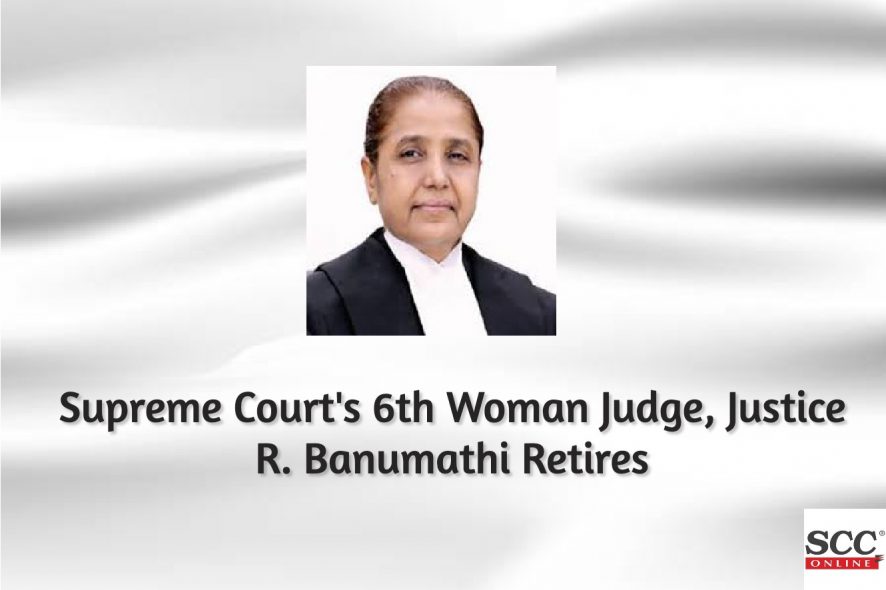Hon’ble Mrs. Justice R. Banumathi born on 20-07-1955 was the sixth woman to be a Judge of the Supreme Court of India and on her last working day as the Supreme Court Judge, we remember her contributions to the Judicial system and to the society.
A brief background on Justice Banumathi’s journey to becoming the 6th woman judge of the Highest Court of the Country:
- Originally from Tamil Nadu, Justice Banumathi enrolled as an advocate in 1981 and practiced on Civil and Criminal sides in Tirupattur and District Court, Krishnagiri, Harur and moffusil courts.
- entered Tamil Nadu Higher Judicial Service in 1988 as a direct recruit ‘District Judge’ and worked as District and Sessions Judge in Coimbatore, Vellore and Principal District and Sessions Judge, Pudukottai, Madras, Tirunelveli and Salem.
- also worked as Chief Metropolitan Magistrate, Madras and as a District Judge dealt with number of landmark cases and also led One-Man Commission on Police Excess by STF in Chinnampathy village, Coimbatore District in 1995-1996.
- was elevated as Judge, High Court, Madras on 03-04-2003. She was Executive Chairman of the Tamil Nadu State Legal Services with effect from 15-07-2013; Chairman of Madras High Court Legal Services Committee from 21-02-2011 to 20-01-2012 and was actively involved in Legal Services and organizing Lok Adalats.
- was appointed as the Chief Justice of Jharkhand High Court on 16-11-2013.
- was elevated as a Judge of the Supreme Court of India on 13-08-2014
- also became the second woman after Justice Ruma Pal to be a part of the Supreme Court collegiums in the last thirteen years.
Did you know?
Justice R. Banumathi has always been interested in continuing judicial education for Judicial Officers and strengthening Judicial Systems, she has organized various training and induction programmes for different judicial batches from time to time along with authoring “Hand Book of Civil and Criminal Courts Management and use of Computers” for guidance of judicial officers and staff members.
Some of her notable judgments include:
- Muniasamythevar v. Dy. Superintendent Of Police [2006 SCC OnLine Mad 306] where she held that that all types of Jallikattu, bullock cart races and oxen races causing cruelty to animals must be banned by the Tamil Nadu government. She further directed the state police to ensure prevention of cruelty to animals under the guise of such entertainments.
- Modern Dental College & Research Centre v. State of M.P. [(2016) 7 SCC 353] where she authored the concurring opinion in the five-judge Bench judgment The judgment ruled in favour of the Madhya Pradesh Government, holding that regulation of private unaided colleges does not necessarily violate the fundamental right to free occupation under Article 19(1)(g). The Act under challenge prescribes for a compulsory State administered common entrance exam, fee fixation and reservations. The petitioners had argued that this amounted to excessive State interference in an autonomous private educational institution. She further observed that as providing education is positive duty of the State, it has an obligation to regulate private institutions to ensure they are providing quality education.
- Mukesh v. State (NCT of Delhi) [(2017) 6 SCC 1] famously known as the “Nirbhaya Judgment” she had authored a separate concurring opinion which prescribed the death penalty for the accused. She stated that the accused’s actions fell within the ‘rarest of rare’ category.
- Bir Singh v. Delhi Jal Board [(2018) 10 SCC 312] where the majority had held that candidates from all States and Union lists could apply to the Delhi Jal Board, as it was administered by the Union. Justice Banumathi dissented, distinguishing between posts for which recruitment was carried out by the Union government and those for which it was carried out by the NCT. She observed that for posts where the recruitment was done by a Union Territory (or the NCT), only SC/STs specified the Presidential Order for that territory may apply.
- Chief Information Commissioner v. High Court of Gujarat [2020 SCC OnLine SC 285] Recently in a significant ruling on the applicability of the Right to Information Act, 2005 to the courts, she held that the Act cannot override the Gujarat High Court rules, in so far as requesting pleadings is concerned she further reasoned that that as the current High Court rules already have a system for obtaining pleadings, citizens cannot rely on the RTI Act to request them. The judgment is likely to set the precedent for all other High Courts and the Supreme Court itself.
It’s not easy being a successful representative and in 69 years of the Supreme Court of India, Justice Banumathi has been one of the 6 women judges giving remarkable judgments and pouring her wisdom for others to follow.






